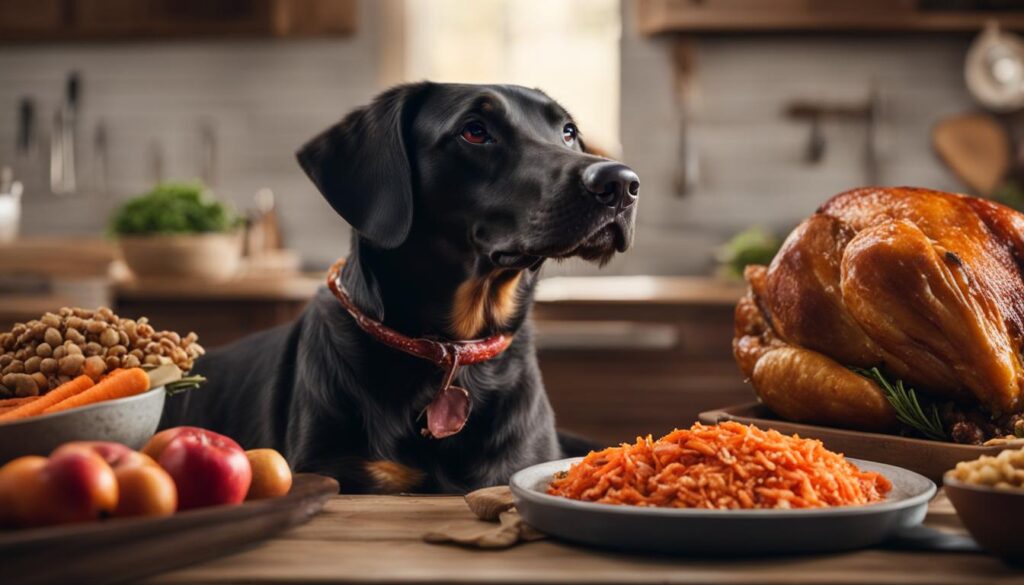Turkey necks for dogs have become a popular chew, with many pet owners choosing to feed them as a treat or part of a raw diet. So, what are turkey necks? What are the benefits of feeding them and are they safe for dogs?
USA Recommendation: Northwest Naturals sourced their turkey from a USDA inspected and passed human facility in the US. Buy their freeze dried turkey necks here on Amazon >>
UK Recommendation: Anco source all their meat from the UK and Europe. Buy their turkey necks on their website >>
This article will help you to understand the pros and cons of feeding turkey necks so you can make an informed decision before choosing to feed them to your dog.
Turkey Necks are moderate to high in calories and should be fed occasionally as a treat.
There are several risks associated with feeding Turkey Necks including bacterial contamination, intestinal blockages, constipation, and choking.
Turkey necks are a by-product of the meat industry, where welfare standards may vary so try to buy free-range products with animal welfare accreditation (RSPCA, Red Tractor, Soil Association).
Turkey necks have become a popular treat for dogs in recent years. As the name suggests, turkey necks are the neck of a turkey, containing vertebrae, cartilage, muscle meat, and connective tissue. Some dog owners choose to feed raw turkey necks as part of a raw diet or as an occasional chew treat. However, there are some important considerations regarding the benefits and risks of feeding turkey necks to dogs.
Benefits of Turkey Necks for Dogs
There are a few potential benefits associated with giving dogs turkey necks in moderation
-
Protein source – Turkey necks provide dogs with high-quality protein, which is essential for building and maintaining muscle. The protein in turkey necks comes from both the muscle meat and cartilage.
-
Mental stimulation – Chewing on turkey necks provides dogs with mental enrichment. The act of chewing helps relieve boredom and stress.
-
Possible dental benefits – The chewing action may help reduce tartar buildup and keep teeth clean. However, research has not conclusively proven dental health benefits.
-
Joint health – Turkey necks contain natural sources of glucosamine and chondroitin, compounds associated with joint health. But levels in necks are unestablished.
-
Recreational chewing – Dogs naturally enjoy chewing, so turkey necks provide a fun activity.
Are Turkey Necks Safe for Dogs?
While turkey necks can provide benefits there are also some potential risks with feeding them to dogs
-
Choking hazard – Turkey necks present a choking risk as they contain small bones. Dogs that gulp their food may swallow large pieces.
-
Gastrointestinal obstruction – Turkey neck bones may cause blockages or obstructions if large pieces are swallowed. This can require emergency surgery.
-
Contamination – Raw turkey necks risk contamination with bacteria like Salmonella. Cooked necks may splinter and cause damage.
-
High in fat – Turkey necks are relatively high in fat. This makes them a problematic treat for overweight dogs or dogs with pancreatitis.
-
Constipation – The bones in turkey necks can lead to constipation in some dogs if too much bone is ingested.
So while turkey necks can be fed safely with precautions, there are definite risks to be aware of. Supervision, proper preparation and portion control are key.
Feeding Guidelines and Safety Tips
If you choose to feed your dog turkey necks, follow these tips to reduce risks:
-
Only feed turkey necks occasionally, no more than 1-2 times per week. They are high in calories.
-
Always supervise your dog while eating turkey necks to prevent choking.
-
Feed appropriate sizes for your dog. Turkey necks may be better suited to medium to large breed dogs.
-
For raw feeding, follow strict hygiene and food safety practices to avoid bacterial contamination. Cooked necks splinter easily.
-
Start with small amounts to allow your dog to adjust to digesting turkey necks.
-
Avoid turkey necks if your dog is overweight or has a digestive disorder like pancreatitis. Consult your vet if uncertain.
-
Never season or enhance turkey necks. Feed plain, unseasoned necks to avoid toxic seasonings.
Following the above guidelines and supervising your dog can allow turkey necks to be fed safely as an occasional treat. But they require caution. Discuss any diet changes with your vet.
Potential Alternatives to Turkey Necks
There are a few other options that provide similar benefits to turkey necks but may be safer for some dogs:
-
Bully sticks – These are a high-protein chew without the choking risk. But they are still high in calories.
-
VHOC approved dental chews – The Veterinary Oral Health Council tests and approves certain dental chews proven to reduce tartar. These avoid bone risks.
-
Chicken necks – For smaller dogs, chicken necks may provide similar benefits as turkey necks but in a smaller size. Still monitor carefully.
-
Stuffed chew toys – Mentally stimulating stuffed chew toys provide recreation without risks of bones or choking.
In many cases, safer alternatives exist. But for dogs that can properly digest turkey necks under supervision, they can provide occasional benefits. Discuss the pros and cons with your veterinarian.
Are Turkey Necks Appropriate for Puppies?
Turkey necks are generally not recommended for puppies for a few important reasons:
-
Choking hazard – The size of turkey necks and small bones make them a choking risk for smaller puppies.
-
Nutritional balance – Growing puppies require balanced calcium and phosphorus intake which turkey necks may unbalance.
-
GI health – Turkey necks may disrupt normal digestion and cause diarrhea in puppies. Their GI systems are still developing.
-
Teething – Hard turkey neck bones can damage puppy teeth during the teething phase. Softer chews are better.
For these reasons, most veterinarians recommend against feeding turkey necks to puppies under one year old. Owners should stick to a high-quality commercial puppy diet and use soft puppy chews for teething and recreation. Once puppies reach adulthood, turkey necks can be reconsidered. But caution is still required.
In conclusion, turkey necks do come with both potential benefits and risks when fed to adult dogs. With proper supervision and preparation, turkey necks present minimal risks and can provide protein, recreation, and dental benefits. But improper feeding can lead to choking, blockages, and other issues. Alternatives like bully sticks and dental chews avoid some of these risks. Turkey necks are never suitable for puppies. By understanding the considerations around turkey necks, dog owners can make an informed decision regarding feeding them as an occasional treat. As always, consult your veterinarian with any diet questions.

Downsides & Risks of Turkey Necks for Dogs
Turkey necks, even when dehydrated, carry the risk of contamination with harmful bacteria such as Salmonella and E.coli. Safe food hygiene practices, such as careful cleaning of surfaces and handwashing after handling these products are essential. Turkey necks, like any product containing bone, are also a potential choking hazard and may cause other complications including constipation and intestinal blockages.
Turkey Necks for Puppies

Turkey necks are not suitable for puppies due to their large size and high quantities of bone. Growing puppies have very strict requirements for calcium and phosphorus and should be fed a high-quality commercial diet that meets these standards. Adding in treats containing bone risks unbalancing this important ratio and puts your pup at risk of developing problems bone and joint problems. Turkey necks are also a choking hazard for puppies that may struggle to chew them and are best fed to adult dogs.
Top Tips: Turkey Necks for Dogs | Dr. Alex Crow | PetHealthGuru | Dog Food | Veterinarian Tips |
FAQ
Can you give dogs cooked turkey necks?
Yes, dogs can eat turkey necks as long as they’re prepared safely and cooked thoroughly. While cooked turkey necks are high in protein and offer nutritional benefits, raw turkey necks contain harmful bacterial like salmonella and can cause food poisoning in dogs when eaten.
What part of turkey can dogs not eat?
Avoid feeding your dog the neck, though, as the bones inside could be dangerous.Nov 14, 2022
Can a dog eat neck bones?
The neck bones have attached connective tissue and valuable nutrients such as phosphorus, calcium plus natural glucosamine and chondroitin helpful in maintaining joint health. Chewing is a form of relaxation for your fur babies and feeding raw meaty bones is an important component of a raw diet.
What is turkey neck treat for dogs?
BJ’s Turkey Necks are not just chews, they’re a natural dental floss for your dog, helping to scrape away plaque and tartar and promoting good oral hygiene. It’s a treat that also serves as a healthy addition to a balanced meal, making it a versatile choice for your pet.
